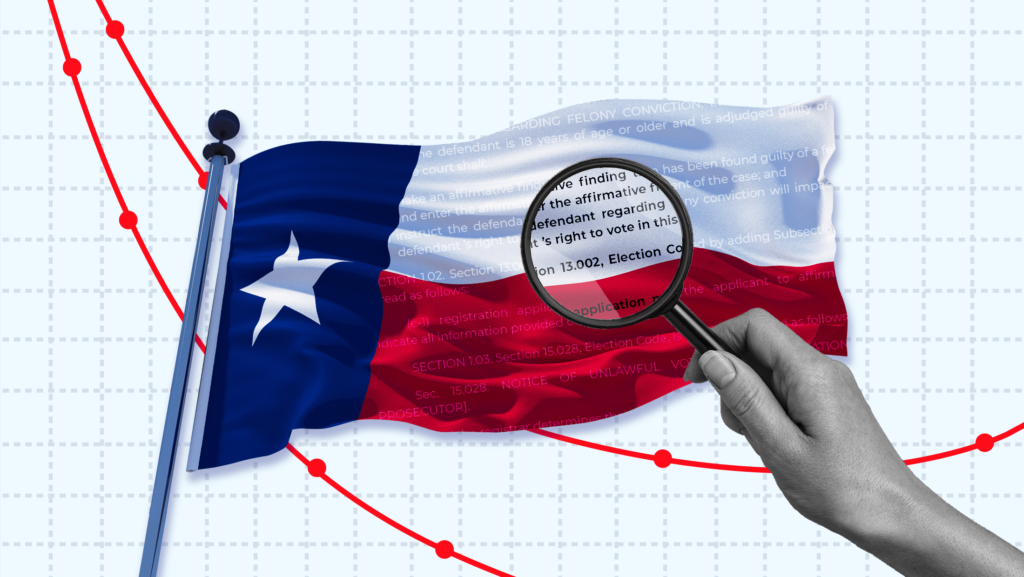How Voting Restrictions Could Hurt Texas’ Economy

Limiting access to the ballot box is undemocratic — it weakens our electoral system and betrays our country’s founding values. It gives some voters more power than others. But, there’s another side effect of voter suppression laws: Limiting ballot access can have severe economic consequences for a state.
A new analysis from the Perryman Group, “The Potential Economic Impact of Legislation Restricting Voter Access on Business Activity in Texas,” predicts the financial ramifications of Republican voter suppression efforts in the Lone Star State: Texas’ economy will lose billions of dollars thanks to decreased worker earnings, lowered consumer spending, reduced tourism, less business investment and decreased tax revenue. In today’s Data Dive, we’ll walk through how voting laws affect economic activity and why Texas Republicans are setting themselves up for serious economic consequences.
Here are the key takeaways:
1. Voting restrictions cost people time and money — and reduce their earnings and spending power.
Voting can be expensive. Typically, Election Day is on a Tuesday between 8 a.m. and 8 p.m. — meaning that most voters have to take time off work to cast their ballots. Companies trying to show their civic engagement have increasingly begun to offer paid time off to go vote, but this advantage does not apply to everyone. And, far too often, the lowest-paid jobs offer the least flexibility. The impracticality of Election Day voting for thousands of working-class Americans is obvious — and Republicans are working hard to cut back on alternative voting methods that allow folks to cast their ballots without taking time off from their jobs. Early voting, mail voting and 24-hour voting are all under attack in Texas, and the ramifications are clear: without expanded voting options, the only people who will have their voices heard are only voters who have the time and financial ability to cast their ballots.
The Perryman Group found that these “internal losses” — of employee earnings and reduced employment — associated with higher voting restrictions could cost the Texas economy a whopping $14.7 billion in gross product per year by 2025. The effects of lost wages and lower earnings incurred while trying to vote in turn affect consumer spending — Texans who are forced to take time off unpaid to vote will have less cash in their pocket to put back into the economy. This domino effect, the study estimates, will result in $1.5 trillion in economic losses over the next 25 years.
2. Companies and consumers from out of state take their business elsewhere when states pass voter suppression laws.
The potential “external losses” are similarly severe. Whether through political pressure or the caution of public relations departments, companies are not eager to conduct business in states that are determined to suppress their voters. Corporations keen to avoid controversy are likely to move their investments and events from states with undemocratic voting laws, and dozens of companies have already made their stance against Texas’ suppression laws clear in public statements. Individual consumers looking to live up to their values also think twice about visiting states with concerning laws, whether on vacation or for work. Furthermore, potential high-value employees are not eager to move to a state that makes it harder for them to vote, a serious concern for long-term economic growth.
Altogether, the Perryman Group estimates, these additional effects add up to losses of $16.7 billion annually by 2025. Again, the domino effect here is clear: Less business activity means less taxable revenue in the state, leading to funding concerns for every-day infrastructure like schools, roads and public investments. This secondary economic impact would lead to “over -$9.1 billion [in losses] to the State and almost -$4.2 billion to local entities by 2045.”
3. Texas’ economy would lose over $30 billion by 2025 if voter suppression laws go into effect.
The main takeaway here is clear — legislation that restricts voting is expensive. The more barriers that Republicans enact between Texans and the ballot box, the more economic losses the state will incur. Voters are resilient, and they will go to great lengths to have their voices heard. But the combined losses of income, spending power, business investment and tourism revenue of making that voting harder to do will have serious ramifications for every Texan, and Republicans will be to blame.